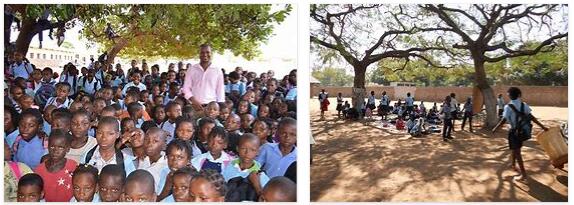A chance only with education
The government of Mozambique is trying to promote education in the country. So it was recognized that only well-educated youth can ultimately solve the country’s difficult problems. Mozambique has many raw materials such as natural gas. But there are too few skilled workers in the country. The locals cannot find work, while foreign skilled workers have to do more demanding work.
The country’s economy is growing, but many people live below the poverty line. They work as farm laborers, in the fishery as market vendors or do odd jobs. The country only has a chance if the education of children and young people improves.
There is a lack of trained teachers
One teacher currently looks after 60 or more students. And there are simply too few well-trained teachers. Many teachers also have no pedagogical training at all. 88 out of 100 children go to school. Nevertheless, many children leave school in elementary school and cannot read and write properly. However, almost all children at least go to school and attend first grade.
As a country located in Africa according to themotorcyclers.com, Mozambique’s problem also lies in the years of civil war, until 1992 an entire generation received almost no schooling. Children had to serve as child soldiers and so almost a whole generation is absent. She just didn’t or hardly went to school. You can still feel the consequences today. And it took a few years for the school system to work at least in part. The schools that had been destroyed were rebuilt, but the government still cannot guarantee an education for everyone.
The official language of Mozambique is Portuguese. Mozambique was a Portuguese colony for many centuries. But not all children speak Portuguese. It’s difficult for them to keep up in first grade.
Long ways to school
The ways to school are often long for the children who go to secondary schools. The girls and boys often have to travel to school for up to three hours. There are no parents who would drive them in a car. 49 out of 100 people in Mozambique cannot read or write. The school enrollment rate rose again over the years after the civil war, but Mozambique also has the problem of AIDS orphans. These children often do not go to school because they no longer have parents.
Illiterate
Many children leave school without being able to read and write properly. And here there are more girls who remain illiterate. The fact that many people cannot read and write is one of the biggest problems in Mozambique, along with the high AIDS rate. The rate is highest among Mozambicans who went to school, or rather did not go to school, in Mozambique in the 1980s. By 1980 only 25 out of 100 women could read and write and 44 out of 100 men. The difference between men and women is particularly striking.
From elementary school to university
In Mozambique, a distinction between the primary – and the secondary school. The primary school corresponds to our primary school. This is compulsory, free of charge and goes up to fifth grade. But here, too, there is the problem that the school is free, but the school books cost money. Many families cannot afford that.
This is followed by the sixth and seventh grades, which also belong to primary school. The secondary school is divided into two areas, the first of which goes from eighth to tenth grade and the second from eleventh to twelfth grade. This school costs school fees and money for school materials is also necessary. For this reason, many parents no longer send their children to school at all.
Anyone who still completes all classes has the Abitur in their pockets. Anyone who would like to go to university afterwards would have the opportunity to do so. There are state and private universities in Mozambique.
Life in a minute
In the following film project, children from Mozambique describe their situation, their lives and their everyday lives in a short film each minute. The project was launched by the aid organization UNICEF. Have a look!
Problems
The slums
Many children live in the slums of Beira or Maputo, the country’s big cities. There they live in simple huts that their parents have put together from stones, wood waste and plastic parts. There are no real toilets there, just something that looks like a toilet. There is also no drain, the smell is often unbearable.
If it rains, the rain floods everything and the water is contaminated with bacteria. Here the children get sick, yet they play in the middle of the dirt. Where else should they go? Many Mozambicans died during the terrible cholera epidemic in 2013. Cholera is a disease that causes severe diarrhea.
Children are also kidnapped
In Mozambique children are abused and bad things are done to them. Children are even kidnapped and sometimes the parents sell their children as well. Often they don’t even want to know what is happening to them. But there are organizations that try to help the children.
More and more children live on the streets. Street children in particular become victims, are kidnapped and exploited. It is especially difficult for them to return to a normal life. Even when they are offered help, they often prefer to live in supposed freedom on the land’s rubbish dumps.
